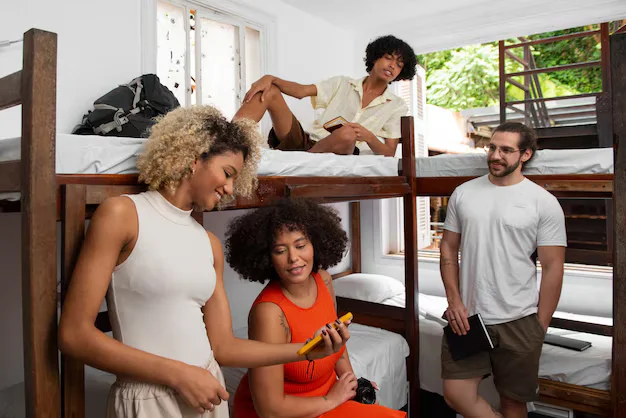Starting your housing search near the University of Southern California can be very much like trying to find your way through a complex maze. Whether you are a freshman looking to move off-campus or a transfer student looking for the perfect apartment, your housing decision will significantly affect your experience at USC.
From USC Village, pulsating to life, to historic University Park, each residence offers different living choices in their character and advantages. You will be surrounded by a dynamic community that balances academic life with the urban heartbeat of Los Angeles.
Before you sign that lease agreement, you have to know some of the most influential factors in your off-campus living experience.
In this article, you will learn the top four things you should take into consideration when renting near USC. From safety to transport considerations, we have everything you need to know.
1. Location and Safety Considerations
The location and safety of the building should be at the top of your list when choosing your off-campus housing near USC. This is the neighborhood that defines your everyday routine and defines your college experience.
North Campus, more so around the USC Village area, consists of more recent developments that have more security features while being close to amenities on campus. You’ll find yourself within walking distance of classes, reducing your reliance on transportation options like the Metro or F dash bus.
University Park offers more of a typical college environment, with historic homes mixed in with apartment complexes housing students. The west side is a bit more budget-friendly and may require a tad longer commute.
Your safety concerns should extend beyond just location. Look for properties with proper surveillance systems, secure entry points, and well-lit streets.
Many buildings near campus feature 24/7 security personnel and controlled access systems. These safety amenities might increase your monthly expenses but provide valuable peace of mind for you and your parents.

2. Financial Planning and Budget Management
Knowing your entire financial obligation is much more than a simple monthly rent figure. Utilities, internet service, parking, and a security deposit add to your budget. Shared room and single room prices vary at USC; a general rule of thumb is that the prices increase as one gets closer to campus or other prime locations such as the USC Village.
Make a highly detailed budget, including all conceivable expenses. Utilities will change quite a bit depending on the time of year. During the summer, utility bills can be very high due to air conditioning.
Some property management companies incorporate a couple of utilities into the cost of rent; others charge separately for utilities.
You will need to add the cost of the internet, which is very important for academic success. Many students do not plan for parking, and that adds so much more to your monthly expenses, especially when you are closer to DTLA or high-density neighborhoods.
3. Roommate Dynamics and Living Arrangements
Being able to choose a decent set of compatible roommates can either make or break your life off campus. Suppose you are not looking at co-living scenarios or are willing to share an apartment with someone. In that case, there is a need to set boundaries concerning the volume levels, standards of cleanliness, and duties allocated. They are essential and have to be talked about.
To that effect, the whole roommate agreement should also include information on which chores should be done, when and by whom, and the number of guests allowed throughout the week or month.
It is wise to step back before entering into a joint lease to consider things like living habits, class timetables, and social circles. Remember, the convenience of lowered housing costs by renting a place with a flatmate is accompanied by further negotiation and interaction.
You would also want to take into consideration the layout and the space of the possible apartments while preparing for the living conditions. Some layouts tend to work better than others in maximizing the quietness on behalf of the occupants and in organizing those areas of the apartment that are to be shared.

4. Transportation and Accessibility
Your daily commute to campus will make a big difference in your college experience. Properties that are within walking distance from USC may charge higher rents, but they save you time and transportation costs. Think about how you will get to classes, especially for early morning hours or late-night study sessions at the library.
USC offers a number of transportation services, including the F-dash bus and connectors to the greater LA Metro system. A good knowledge of these transportation networks opens up your housing options to some of the less expensive areas and keeps your commute times reasonable.
Metrolink and LADOT services are other options for getting to campus from the surrounding neighborhoods. You can research the reliability and frequency of the available public transportation options in your would-be neighborhood.
Some areas are not as well connected with others, especially during off-peak hours. If you want to drive, be sure to budget for a transportation pass or car maintenance cost.

Conclusion
Your off-campus housing decision near USC is more than just where you sleep. It is a decision that will help to define your whole college experience. Carefully considering questions about location and safety, financial planning, roommate dynamics, and transportation options equips you to make an appropriate decision.
Do take the time to research thoroughly, tour more than one property, and ask all the detailed questions before signing any lease agreement.
Remember that the balance between comfort, convenience, and cost requires you to take in all factors.
With proper planning and research, it will be possible to find an off-campus living situation that enhances your USC experience and provides a comfortable home base for your academic journey.







